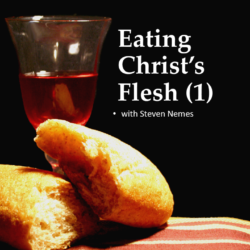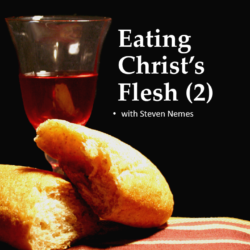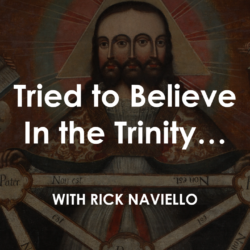Dr. Steven Nemes is an analytic philosopher and theologian who uses a phenomenological approach to reading scripture and constructing theology. In this interview I ask him about his unique approach to evaluating doctrine, especially the Trinity, from a phenomenological perspective. We also discuss restorationism as a common ground and delve into Church history extensively. In the end Nemes argues for freedom rather than dogma when evaluating various doctrines related to the Trinity.
Listen to this episode on Spotify or Apple Podcasts
—— Links ——
- Check out Nemes’ personal website, blog on substack, and YouTube channel
- Here is his interview with Dale Tuggy from three months ago
- Follow Nemes on Twitter @snemes2
- Support Restitutio by donating here
- Designate Restitutio as your charity of choice for Amazon purchases
- Join our Restitutio Facebook Group and follow Sean Finnegan on Twitter @RestitutioSF
- Leave a voice message via SpeakPipe with questions or comments and we may play them out on the air
- Intro music: Good Vibes by MBB Attribution-ShareAlike 3.0 Unported (CC BY-SA 3.0) Free Download / Stream: Music promoted by Audio Library.
- Who is Sean Finnegan? Read his bio here
—— Questions for Interview ——
1. Most people know what systematic theology is–simply the categorizing of doctrines or beliefs–but most don’t know what phenomenology is. Can you offer a brief explanation?
2. A lot of your work focuses on reading scripture. Why did you decide to focus on the phenomenology of reading the bible?
3. Let’s talk about the Trinity. When I listened to your interview with Dale Tuggy in September you listed off a whole series of problems with the Trinity. Then he asked you, “Well, why do you still believe in it?” You replied because it’s hard to disprove one ousia in 3 subsistences. Now, however, you no longer identify as a trinitarian. What changed?
4. You mentioned Mark Edwards’ book, Catholicity and Heresy that what the Gnostics did–hypostatizing attributes of God like wisdom, spirit, mind, etc.–influenced Nicene reasoning. Could you talk more about that?
5. You’ve recently been making a public case for unitarian theology and christology, what has prompted that?
6. It seems like you’re a fan of the Polish Brethren and specifically, their book The Racovian Catechism. What drew you to this work? Would you identify as a Socinian?
7. Tell me about your book, Orthodoxy and Heresy. What’s the main idea.
8. As you probably know unitarians have been excluded, deplatformed, persecuted, and even martyred for centuries. Have you faced any opposition?
9. What advice would you give to unitarian Christians to help us grow as a movement?







“In my less charitable moments, I think there is something pathological about the way some people speak about mystery in religion. It’s almost as if they find nothing worthwhile in a Christianity that they can make sense of. They prefer to throw themselves headlong into the night of the understanding and to contemplate and to affirm as absolutely necessary doctrines that they admit surpass human comprehension. But why? Where does this impulse come from? Why would anyone prefer to walk into the dark? Perhaps they prefer their religion to be mysterious so as to place it beyond the possibility of refutation or falsification. If it can hardly be understood, it surely can’t be proven wrong.”
https://snemes2.substack.com/p/why-not-trinity-and-incarnation?fbclid=IwAR09HQmJrUQXzY-6K6_S7LHiGAasWyHyzjoNtyJH5gRjGwNuPTgz9Q0q-ew
Thank you, Steven and Sean for an interesting, deep, and thought-provoking discussion.
With respect to much of the post-apostolic development of historic Christianity, I believe that one of the reasons why the Gospels focus quite a lot on the Pharisees is to emphasize the fact that any religion, sect, or denomination that takes itself too seriously is liable to became ‘Pharisaic’, i.e. very ‘religious’, but arrogant, self-righteous, spiritually blind, and hypocritical. As Sebastion Castellio (1515-1563) put it :
” There is hardly any sect which does not condemn all others and desires to reign alone …..All sects [and denominations] hold their religion as established by the Word of God, and call it certain..”
(‘Concerning Heretics’; pp.; 122-123, 281-282.)
“